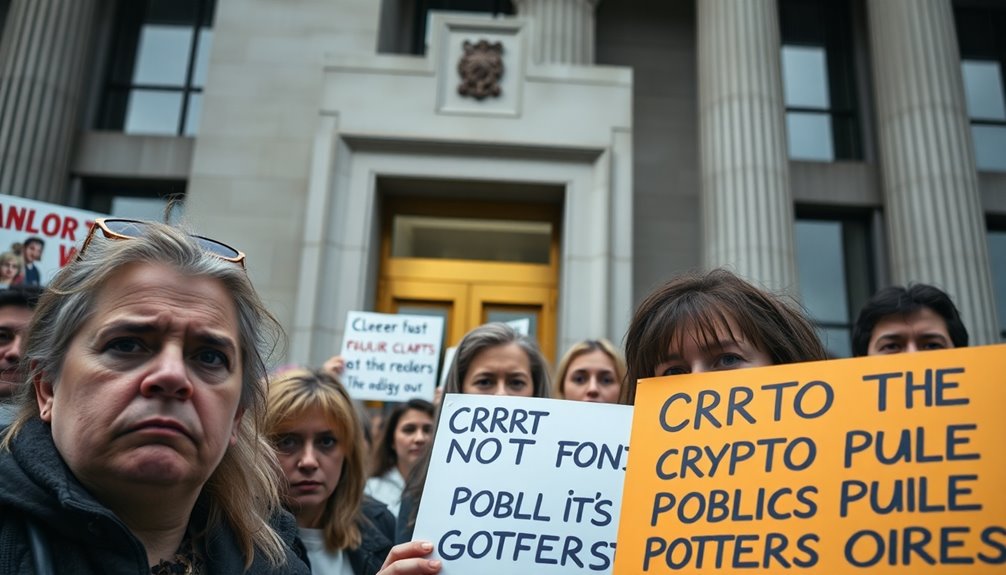Crypto News
Crypto Public Offers Face Scrutiny as UK FCA Proposes Ban—All the Details
You won’t want to miss how the UK’s FCA’s proposed ban on public crypto offers could reshape the investment landscape—discover the critical details now.

The UK's FCA is proposing a ban on public crypto offers from non-regulated entities to enhance investor protection and market integrity. This move aims to shield you from misleading promotions while ensuring that regulated platforms can still operate under strict guidelines. The new framework emphasizes transparency, requiring comprehensive disclosures about risks, costs, and fees for crypto investments. Additionally, the FCA is addressing market abuse with tougher regulations and penalties. As consultations continue until March 2025, there's a lot to cover about these upcoming changes and their impact on the crypto landscape, so stick around for further insights.
Key Takeaways
- The FCA proposes a ban on public crypto offers from non-regulated entities to enhance investor protection and market integrity.
- Regulated platforms can still conduct offers if they adhere to new prudential requirements under the proposed framework.
- Stricter disclosure requirements will ensure transparency about risks, costs, and fees associated with cryptoassets, especially for public offers exceeding a specific threshold.
- The regulations aim to prevent market abuse, with authorized platforms required to report suspicious activities and maintain robust surveillance.
- The consultation period for industry feedback on the proposed regulations is open until March 2025, with final rules expected by 2026.
Overview of FCA Proposal

The UK Financial Conduct Authority (FCA) is taking significant steps to regulate the crypto market by proposing a ban on public crypto offers from non-regulated entities. This ban aims to extend existing restrictions on crypto promotions, making it harder for unregistered firms to target UK clients.
Regulated trading platforms may still facilitate public offers, provided they meet prudential requirements and perform due diligence. The FCA's proposal is part of a broader initiative to enhance oversight and create a safer crypto environment in the UK. It includes a new framework that addresses crypto-asset admissions, disclosures, and market abuse measures. The focus is on protecting investors from misleading promotions and ensuring market integrity.
By adapting existing market abuse regimes to fit the unique challenges of the crypto sector, the FCA intends to prohibit insider trading and prevent market manipulation. Consultations on these changes are ongoing, with feedback sought until March 2025. The FCA plans to publish draft regulations in 2025, with the final framework expected to roll out by 2026.
This regulatory shift could lead to a decline in speculative token sales and foster greater investor trust, ultimately paving the way for legitimate businesses and institutional capital in the crypto market.
Goals for Investor Protection

Investor protection lies at the heart of the FCA's proposal, aiming to create a safer environment for those navigating the crypto market. The FCA seeks to shield you from misleading promotions and unregulated public offers that can lead to significant financial losses. By preventing unregistered firms from targeting UK clients, the proposal reduces your exposure to scams, misrepresentation, and volatile markets.
To enhance transparency, the FCA plans to introduce clear rules for disclosures and admission processes in public offers. This includes requiring crypto exchanges to perform due diligence and mandating the disclosure of critical information about issuers, such as risks and conflicts of interest. Additionally, the FCA emphasizes the importance of compliance with anti-money laundering laws, which will further protect investors.
Moreover, the proposal emphasizes strict oversight and compliance, ensuring crypto firms adhere to anti-money laundering regulations and undergo independent auditing. You'll benefit from measures that reimburse victims of fraud and unauthorized transfers, while also enjoying increased cybersecurity protections for your assets.
Ultimately, these goals aim to bolster your confidence in the crypto market, creating a level playing field where regulated exchanges can thrive and earn your trust.
Ensuring Market Integrity

While navigating the evolving crypto landscape, you need assurance that market integrity is upheld. The proposed regulations aim to promote transparency and prevent market manipulation, ensuring all participants adhere to the same standards.
The FCA emphasizes the importance of authorized trading platforms sharing relevant market abuse data to identify and eliminate suspicious activities. By implementing strict measures, the FCA is creating a level playing field that reduces the risks of manipulation and fraud. Additionally, the FCA's regulatory approach focuses on serious consideration of risks associated with crypto firms, which is crucial for maintaining market integrity.
To enhance transparency, MiCA mandates clear disclosure requirements, compelling crypto-asset service providers to offer accurate information. The FCA's proposal seeks to extend the ban on unregistered crypto promotions, further protecting consumers.
Additionally, market surveillance has been strengthened to monitor unusual activities, which helps maintain investor trust.
Regulatory oversight is also tightening, with the FCA introducing a rigorous marketing regime that can impose severe penalties for non-compliance. This scrutiny is evident, as only a small fraction of crypto applications have received approval.
New Regulatory Framework

With market integrity firmly in focus, a new regulatory framework is set to reshape the UK crypto landscape. This framework aims to protect investors by preventing misleading promotions and unregulated public offers that pose significant risks. It enhances market integrity through measures that combat market manipulation and ensure fair practices. The FCA is seeking public comment on crypto regulations as part of its feedback process.
The framework comprehensively covers stablecoins, staking services, and core activities like cryptoasset trading and custody. It shifts from the existing AML regulations to a more robust conduct regime, prohibiting public crypto offers, including ICOs, with exceptions for regulated platforms. Existing rules barring unregistered firms from promoting crypto-related products will also extend. Set to roll out by 2026, this framework promises tighter access for unregulated firms, increasing oversight for compliant platforms.
You can expect improved investor protection through clear disclosure rules and measures against market abuse. While this shift might challenge some crypto projects, it's likely to foster regulated innovation, attracting legitimate businesses and institutional capital.
Seeking Industry Feedback

As the UK government moves forward with its regulatory framework for crypto, it's actively seeking industry feedback to ensure the new rules are fair and effective.
You have until 14 March 2025 to share your insights, as this feedback is part of a broader effort to shape the UK's crypto regime. This initiative builds on earlier consultations and incorporates insights from crypto roundtables held earlier this year.
The government encourages you and other stakeholders to collaborate, offering your expertise to help establish regulations. Input from crypto firms, regulators, and even consumers is crucial for comprehensive oversight.
Key areas for your feedback include market entry regulations, disclosure obligations, anti-market abuse measures, and controls to prevent consumer harm.
Discussion Paper DP24/4 outlines the proposals and invites your comments. By participating, you can help promote good practices in the sector and prevent harm.
Authorised trading platforms may share information to combat market abuse, creating a level playing field that fosters greater investor trust. Your transparency and insights will empower consumers to make informed financial decisions as the regulatory landscape evolves. Moreover, clear regulations enhance the integrity of UK crypto markets, providing necessary protections for consumers.
Impact on Crypto Industry

The impending regulatory changes are set to reshape the crypto industry, emphasizing investor protection and market integrity. By banning public crypto offers from unregistered entities, the FCA aims to prevent misleading promotions and safeguard retail investors. You'll notice clearer rules on disclosures, allowing you to make informed investment decisions while reducing the risk of scams and misrepresentation. This heightened transparency will protect you from the volatility and fraudulent activities often seen in the market.
With stricter regulations in place, market manipulation should become less of a concern, fostering a fairer trading environment. Authorized platforms will be required to share market abuse data, helping to identify suspicious activities. As a result, speculative token sales and ICOs targeting retail investors may decline, creating a level playing field for compliant exchanges. Additionally, the FCA's proposed ban on public virtual asset offers reflects a broader initiative to align with global regulatory efforts to control unregulated offerings linked to scams and losses.
Regulated platforms could gain a competitive edge, attracting institutional investors drawn by increased trust and transparency. While there might be a decline in the number of crypto projects due to stricter rules, this shift could usher in legitimate businesses and foster innovation within a more structured framework. Ultimately, these changes aim to create a safer, more transparent cryptocurrency market for all participants.
Addressing Market Abuse

Addressing market abuse in the crypto space requires robust measures to ensure fair trading practices. The UK's Market Abuse Regime focuses on behavior related to cryptoassets traded on regulated platforms, aiming to create a safer environment for investors.
You're likely aware that trading platforms need to detect, deter, and disrupt market abuse effectively. This means they've a responsibility to monitor transactions and identify suspicious activities promptly.
Insider dealing is another critical issue, with legislation designed to prohibit such actions and mandate the disclosure of inside information. This helps prevent market manipulation and ensures that all investors have access to the same information. Furthermore, the FCA's crypto roadmap indicates that the new regime will address these challenges more comprehensively.
However, cross-border challenges complicate the enforcement of these regulations, given the fragmented nature of the market.
To enhance transparency, authorized platforms must share market abuse data, fostering collaboration among stakeholders.
Regulatory oversight is strengthened to ensure compliance, ultimately protecting consumers from manipulation and fraud. As these measures take effect, they'll contribute to a more trustworthy crypto landscape, where fair trading practices prevail and market integrity is upheld.
Disclosure Requirements

Ensuring transparency in crypto public offers is vital for building investor trust. When you're considering investing, it's crucial that the offer discloses all material information. If the public offer exceeds a certain threshold, you should expect to see comprehensive details about the features, prospects, and risks associated with the cryptoassets. This includes your rights and obligations as an investor, along with information about the underlying technology, such as the protocol and consensus mechanism.
Moreover, cryptoasset trading platforms must highlight key risks relevant to the assets being promoted. You need to be aware of any costs, fees, and charges associated with the products or services offered. If a cryptoasset claims stability, the risks specific to it must be clearly outlined. The FCA's proposed ban on public crypto offerings by unregulated firms aims to enhance this transparency and protect investors.
The FCA mandates that disclosures go beyond basic requirements to ensure good consumer outcomes. This includes the legal status of the cryptoasset and its governance mechanisms.
For regulated stablecoins, you'll find specific disclosures about redemption policies and backing assets, which are essential for informed investment decisions. Clear and fair financial promotions aren't just nice to have; they're a necessity in today's crypto landscape.
Future of Crypto Regulation

Anticipating a future shaped by evolving regulations, the crypto landscape is poised for significant transformation.
You'll likely see a push for global standards to address the unique challenges of anonymity and cross-border transactions. Regulators are shifting towards activity-based frameworks, aligning crypto-assets with traditional financial activities to enhance oversight.
Consumer and investor protections will be prioritized, as regulators aim to mitigate risks like fraud and cyber threats. This could mean stricter regulations on public crypto offers, ensuring only regulated entities can operate. Moreover, effective regulations must protect stakeholders against risks such as AML and KYC violations.
Legislative changes might be necessary to define the roles of regulatory bodies and clarify when a cryptocurrency is categorized as a security or commodity.
As market activities grow, the focus on compliance and enforcement will intensify. Expect multiple regulatory agencies to play a role, emphasizing the need for firms to align their strategies with regulatory expectations.
Balancing risk mitigation with innovation will be crucial, particularly in the burgeoning stablecoin market.
Ultimately, the future of crypto regulation aims to foster growth while safeguarding investors, ensuring a resilient and transparent financial ecosystem for all participants. One key example of this evolving regulatory landscape is the South Korean crypto institutionalization, which seeks to provide a clear framework for the trading and exchange of cryptocurrencies within the country. By establishing guidelines for compliance and oversight, South Korea aims to promote responsible and secure participation in the crypto market. This proactive approach reflects a global trend towards balancing innovation with accountability in the rapidly expanding world of digital assets.
Frequently Asked Questions
How Will This Ban Affect Existing Crypto Investments?
This ban will impact your existing crypto investments by increasing market transparency and reducing the risk of scams.
You'll benefit from clearer rules and better protection against misleading promotions. However, you might experience some volatility as the market adjusts to new regulations.
If you're invested in platforms that comply with the new standards, you'll likely find greater investor trust and stability, which can ultimately enhance your investment's long-term prospects.
What Types of Crypto Offers Will Be Exempt From the Ban?
Certain types of crypto offers might be exempt from the ban, depending on specific conditions like the type of crypto asset or the nature of the offer.
If you're involved with a regulated crypto trading platform or a registered cryptoasset business, you may find exemptions available.
These could include promotions approved by authorized persons, which allow you to communicate financial promotions without needing prior approval.
Always check compliance with relevant regulations to ensure eligibility.
When Will the Finalized Regulations Be Implemented?
You can expect the finalized regulations to be rolled out in 2026.
This framework will address important aspects like public offers, market disclosures, and anti-market abuse measures.
The goal is to strike a balance between fostering innovation and protecting investors.
As these regulations take shape, you'll see a comprehensive approach that enhances market integrity and reinforces confidence in the cryptoasset market, benefiting both consumers and industry participants alike.
Can International Crypto Firms Operate Under This New Framework?
Yes, international crypto firms can operate under the new framework, but you'll need to comply with the UK's Financial Conduct Authority (FCA) regulations.
This includes registering with the FCA, following anti-money laundering rules, and implementing robust governance systems.
If you're targeting EU investors, you'll also need to adhere to MiCA regulations.
Navigating both UK and EU rules is crucial for smooth operations, so ensure you stay updated on compliance requirements.
What Penalties Exist for Non-Compliance With the New Regulations?
If you don't comply with the new regulations, you could face serious penalties.
Non-compliant firms may incur unlimited fines and even face imprisonment for up to two years.
The FCA can take action against any firm illegally marketing to UK consumers, regardless of their location.
It's crucial to ensure your marketing is clear and fair to avoid legal trouble and hefty financial consequences.
Stay compliant to protect your business and reputation.
Conclusion
In conclusion, the FCA's proposal to ban crypto public offers reflects a crucial step toward enhancing investor protection and market integrity. As the regulatory landscape evolves, it's essential for you to stay informed and engaged with these changes. By understanding the implications of this proposal, you can better navigate the crypto industry and ensure your investments align with the new standards. Ultimately, your awareness and adaptability will play a key role in shaping the future of crypto regulation.
Thorsten has been immersed in the cryptocurrency world for several years. His early experiences as a miner and active market participant have given him first-hand knowledge of the industry’s highs and lows. Thorsten’s approach is grounded in transparency and honesty, ensuring our editorial direction remains authentic, accurate, and reader-focused.
Crypto News
Coinbase’s Strategic Win: Judge Failla’s Landmark Appeal Decision
Facing a pivotal moment, Coinbase’s strategic win in Judge Failla’s decision could redefine crypto regulations—discover the implications that lie ahead.

You'll want to take note of Coinbase's strategic win in Judge Katherine Polk Failla's recent decision. She granted their motion for an interlocutory appeal, allowing Coinbase to challenge the SEC's allegations while keeping their operations running. This ruling pauses the lawsuit until the appellate court decides, addressing crucial questions about crypto securities laws. A favorable outcome could reshape regulations, potentially benefiting not just Coinbase but the broader cryptocurrency ecosystem. The community is optimistic, and this landmark decision may pave the way for other firms facing similar challenges. There's more to explore about the implications of this ruling.
Key Takeaways
- Judge Failla's decision allows Coinbase to appeal, pausing ongoing litigation and enabling a challenge to SEC's allegations of operating as an unregistered exchange.
- The appeal seeks clarity on how the Howey test applies to crypto transactions, potentially reshaping regulatory interpretations of securities laws.
- A favorable outcome for Coinbase could limit the SEC's regulatory reach, benefiting the broader cryptocurrency ecosystem and enhancing investor confidence.
- The community has shown strong support for Coinbase, viewing the ruling as a significant win against the SEC's aggressive regulatory stance.
- The Second Circuit Court's decision will set a precedent for how digital assets are classified, impacting future regulatory challenges for the crypto industry.
Overview of Judge Failla's Decision

Although interlocutory appeals are uncommon, Judge Katherine Polk Failla's decision to grant Coinbase's motion signals a significant opportunity for the company.
By allowing this appeal to be heard by the Second Circuit, you get the chance to challenge the trial court's ruling while the case is still ongoing. This rare move indicates that Judge Failla sees a significant issue worth reviewing, particularly regarding conflicting interpretations of crypto securities laws. The recent ruling emphasizes the need for clarity on the legal framework surrounding crypto transactions.
With the lawsuit proceedings on hold until the appellate court makes its decision, you can expect a momentary reprieve that may clarify essential legal questions.
Ultimately, this decision represents a temporary win for Coinbase, potentially reshaping the regulatory landscape for the entire crypto industry.
SEC's Allegations Against Coinbase

As the SEC's allegations against Coinbase unfold, the company faces serious scrutiny for operating as an unregistered national securities exchange, broker, and clearing agency since 2019.
The SEC claims Coinbase unlawfully facilitated billions in crypto asset securities transactions without proper registration, depriving investors of essential protections.
Additionally, Coinbase's staking-as-a-service program, which pools assets and provides rewards, has also drawn allegations of unregistered securities offerings.
The SEC argues these transactions qualify as investment contracts under the Securities Act, invoking the Howey test. Judge Failla's ruling allows Coinbase to appeal SEC claims, highlighting the ongoing legal battle's significance.
With charges of violating multiple Exchange Act and Securities Act sections, the SEC asserts that Coinbase's operations lack the regulatory safeguards necessary for investor protection, raising critical questions about the future of crypto regulation.
Potential Implications of the Appeal

Should the Second Circuit rule in favor of Coinbase, it could radically reshape the regulatory landscape for the entire cryptocurrency industry.
This decision might clarify whether cryptocurrency transactions qualify as "investment contracts" under the Howey test, setting vital precedents for future regulatory actions. A favorable ruling could limit the SEC's reach, influencing how other cryptocurrency firms navigate compliance. Additionally, the ruling raises questions about the SEC's authority in regulating digital asset transactions, which could further impact the industry's dynamics.
You might see a shift towards more lenient regulations, benefiting the entire ecosystem. The pause in district court litigation allows Coinbase to concentrate on the appeal without pressing legal concerns.
Ultimately, the ruling could boost investor confidence and stabilize the market, impacting the operational strategies of exchanges and token issuers significantly.
Legal Context and Major Questions

Coinbase's appeal raises significant legal questions that could redefine how cryptocurrency transactions are classified. Central to the case is whether crypto assets qualify as "investment contracts" under the Securities Act, a question deemed crucial by Judge Failla.
The SEC accuses Coinbase of operating an unregistered securities exchange, arguing that its staking program involves the illegal sale of unregistered securities. This situation hinges on the Howey test's application, which remains contentious.
Judge Failla's decision to grant an interlocutory appeal underscores the need for clarity amidst conflicting judicial opinions. As the appeal proceeds in the U.S. Court of Appeals for the Second Circuit, the outcome could reshape regulatory frameworks and potentially curtail the SEC's enforcement actions against Coinbase. This ruling has been described as a significant win by Coinbase's Chief Legal Officer, Paul Grewal, highlighting its strategic importance for the company.
Community Reactions and Support

How has the community reacted to the recent court ruling? The response has been overwhelmingly positive.
Coinbase's Chief Legal Officer, Paul Grewal, expressed gratitude on X, likening the ruling to a referee stopping play for a review. He highlighted the ruling's significance against the SEC's aggressive stance. Additionally, the court dismissed claims of Coinbase acting as an unregistered broker, reinforcing the positive sentiment surrounding the ruling.
Legal experts, like James "MetaLaw" Murphy, predict a favorable outcome for Coinbase, while Amanda Tuminelli sees the dismissal of the broker claim as a win for DeFi.
Next Steps in the Proceedings

With the community rallying behind Coinbase following the recent court ruling, the next important phase involves the appeal process granted by Judge Katherine Polk Failla.
Coinbase's interlocutory appeal will be heard by the Second Circuit Court of Appeals, allowing you to challenge the SEC's allegations while the case remains ongoing. This stay halts district court litigation until the appeal is resolved, focusing on whether digital asset transactions qualify as "investment contracts" under securities law. The SEC allegations include operating as an unregistered exchange and broker-dealer, which adds further complexity to the case.
The outcome will clarify if Coinbase's crypto offerings fall under these rules, potentially setting a precedent for other firms facing similar challenges.
Ultimately, the Second Circuit's guidance could significantly influence the future of crypto regulation and the SEC's approach to the industry.
Frequently Asked Questions
What Is the Howey Test in Relation to Cryptocurrencies?
The Howey Test helps you determine if a cryptocurrency qualifies as a security.
You'll look for four criteria: an investment of money, an expectation of profits, a common enterprise, and reliance on others' efforts.
If a crypto asset meets all these, it's likely classified as a security.
For instance, decentralized assets like Bitcoin mightn't pass, while centralized ones, like stablecoins, often do due to their dependence on the issuer's efforts.
How Could This Appeal Affect Other Cryptocurrency Companies?
This appeal could significantly impact other cryptocurrency companies by clarifying whether their transactions fall under securities law.
If the ruling establishes clear guidelines, you might find it easier to navigate regulatory compliance, reducing costs and risks.
It could also set a precedent, encouraging similar appeals and shaping how your services are structured.
Ultimately, this decision could boost market confidence, influencing how the broader crypto community engages with regulatory bodies.
What Is the Major Questions Doctrine?
The major questions doctrine is a legal principle that assumes Congress doesn't delegate significant political or economic issues to executive agencies without explicit permission.
When you encounter a case where agencies claim substantial authority, this doctrine guides courts to ensure they don't overreach.
It emphasizes the need for clear congressional authorization, especially for major decisions, helping maintain a balance between legislative intent and executive power in regulatory matters.
When Is the Second Circuit Expected to Make a Decision?
You won't find a specific timeline for when the Second Circuit is expected to make a decision.
The appeal process can take several months due to its complexity. Factors like the court's schedule, workload, and any additional submissions could delay things further.
Keep an eye on related cases, as they might influence the timeline. The outcome will depend on how effectively both sides present their arguments during this period.
What Are the Potential Consequences for Investors in Coinbase?
If the appeal leads to clearer regulations, you might see increased confidence in investing in Coinbase.
Clearer rules could reduce legal uncertainties, making the market more stable and attracting institutional investors.
If the court rules favorably, it could limit the SEC's oversight, allowing Coinbase to offer more services without disruption.
Ultimately, you'll likely face reduced risk and potential for better returns as the regulatory environment becomes more defined.
Conclusion
In light of Judge Failla's decision, you can see how Coinbase's legal standing has strengthened against the SEC's allegations. This ruling not only sets a precedent for the crypto industry but also sparks important discussions about regulation and compliance. As the community rallies in support, the implications of this appeal could reshape the future of cryptocurrency exchanges. Keep an eye on the next steps in these proceedings; they're bound to influence the landscape significantly.
With a background in software engineering and a passion for entrepreneurship, Charlotte leads Feature Buddies with innovation and strategic vision. Her insights into the digital landscape inform our understanding of emerging technologies and platforms.
Crypto News
Ripple President: XRP ETF Launch Imminent
Notable developments suggest an imminent XRP ETF launch, which could revolutionize the cryptocurrency market and attract significant institutional investments. What comes next?

Ripple's president has indicated that the XRP ETF launch is imminent, reflecting a significant shift in the regulatory environment. Following the SEC's approval of multiple bitcoin ETFs, several asset managers are pushing for XRP ETFs. Notably, Bitwise recently filed for approval, and 21Shares offers an XRP ETP on the Swiss Exchange. Analysts project over a 70% chance of favorable outcomes by 2025. If approved, the XRP ETF could attract a flood of institutional investments, further enhancing XRP's market position. Stay tuned to discover how these developments could potentially reshape the cryptocurrency landscape.
Key Takeaways
- Ripple is actively engaging with regulators, enhancing the likelihood of a favorable ETF approval outcome soon.
- The current favorable regulatory environment could expedite the approval process for XRP ETFs.
- Polymarket indicates over a 70% chance of a positive outcome for XRP ETF approvals by 2025.
- High trading volumes and XRP's significant price increase suggest strong market interest in the upcoming ETF.
- Major platforms are expected to support Ripple's initiatives, potentially facilitating a swift ETF launch.
Regulatory Environment Changes

As the regulatory landscape evolves, the recent approval of spot bitcoin ETFs signals a pivotal moment for cryptocurrencies.
The SEC's decision to approve 11 ETFs on January 10, 2024, after years of rejections, highlights a significant shift in attitude. This change, influenced by a favorable court ruling for Grayscale Investments, suggests that regulators are becoming more open to crypto assets. In a landmark move, the SEC authorized eleven spot bitcoin ETF applications, marking the first U.S. ETFs to hold bitcoin directly.
However, SEC Chair Gary Gensler clarified that this approval pertains only to bitcoin, indicating ongoing scrutiny of other digital assets.
The new listing rules aim to enhance investor protections, ensuring transparency and preventing fraud.
As these ETFs enter the market, you're witnessing cryptocurrencies inch closer to mainstream acceptance, paving the way for future innovations like XRP ETFs.
Current ETF Filings Overview

With growing interest in XRP ETFs, multiple asset managers have stepped up to file for approval.
Canary Capital, WisdomTree, and 21Shares are among those pursuing this opportunity. In October, Bitwise submitted a registration statement (Form S-1) to the U.S. Securities and Exchange Commission (SEC) for an XRP ETF.
These filings reflect a strong demand for XRP-based financial instruments, though they currently await SEC approval.
Notably, the 21Shares Ripple XRP ETP already trades on the Swiss Exchange, boasting a fund size of approximately USD 496.85 million.
With an ongoing charge of 2.50%, this ETP showcases the growing interest and potential for profitability in the XRP market, highlighting the momentum behind current ETF endeavors. Additionally, the favorable regulatory environment is noted to potentially accelerate the approval process for these ETFs.
Anticipated Launch Timeline

While no specific launch dates for the XRP ETF have been confirmed, near-term developments are on the horizon.
As optimism grows among market participants, many predict a favorable outcome by 2025. With over 70% chances noted by Polymarket, the climate is ripe for potential approval.
Ripple's ongoing dialogues with regulators and strategic partnerships are paving the way for a smoother entry into the market. You can expect major platforms like Coinbase to list Ripple's RLUSD stablecoin soon, with more exchanges like Bullish and MercadoBitcoin following. Additionally, the recent surge in trading volumes for RLUSD underscores the growing interest in Ripple's offerings.
If the SEC's appeal doesn't hinder progress, a ruling in Ripple's favor could significantly boost XRP's chances for ETF approval, creating exciting opportunities for investors and the broader crypto community.
Market Impact on Trading

The impending approval of an XRP ETF is likely to have a significant impact on trading dynamics in the cryptocurrency market.
As institutional investors flock to regulated exposure, you could see substantial buying pressure driving XRP's price higher. Historical inflows into Bitcoin and Ethereum ETFs highlight the potential for over $100 billion in new capital. This influx not only enhances XRP's legitimacy but also attracts a wider range of investors, as XRP ETFs offer simplified access to investments without the need for crypto wallets.
The current speculative interest has already pushed XRP's price up by over 310%, signaling strong market engagement. With trading volumes surging, particularly in South Korea, you might experience increased volatility. As excitement builds, the trading landscape could shift dramatically, creating new opportunities and risks for all participants.
Ripple's RLUSD Stablecoin

Ripple's RLUSD stablecoin represents a significant advancement in digital currency, offering a reliable, US dollar-pegged alternative for users. With its 1:1 peg to the US dollar, you can expect stability and predictable value. Available on both the XRP Ledger and Ethereum blockchain, RLUSD supports fast transactions that confirm in just 3–5 seconds, making your financial activities seamless and cost-effective. It's fully backed by real reserves, ensuring trust and compliance under a New York Trust Charter. Additionally, RLUSD is designed for everyday payments, making it an ideal choice for both individuals and businesses. Plus, with lower fees compared to USDT or USDC, you'll benefit from instant settlements and easy integration with DeFi platforms. Whether for cross-border payments or enterprise solutions, RLUSD is versatile and ready for various financial use cases.
Strategic Plans for Growth

As the cryptocurrency landscape continues to evolve, strategic plans for growth are becoming essential for companies like Ripple.
With multiple asset managers filing for XRP ETFs, including Canary Capital and WisdomTree, Ripple stands to benefit from a more favorable regulatory environment. The incoming U.S. administration's crypto-friendly approach is likely to expedite ETF approvals, and optimism surrounding XRP's potential approval is high. Ripple's payment solutions have already doubled, showcasing robust institutional demand. As market interest in crypto ETFs grows, Ripple's commitment to engaging with regulators will be crucial. Additionally, the anticipation for RLUSD's imminent expansion on major exchanges reflects the growing interest in Ripple's offerings.
With significant growth predicted for 2025, aligning Ripple's initiatives with institutional adoption will position the company for success in the expanding cryptocurrency ecosystem.
Frequently Asked Questions
What Is the Significance of XRP in the Crypto Market?
XRP plays a crucial role in the crypto market by facilitating fast, cost-effective cross-border payments.
With transaction times under five seconds and costs below a cent, it transforms international finance. Its widespread adoption by over 300 financial institutions highlights its global reach.
The XRP Ledger's real-time settlement and security features make it appealing for both traditional and digital asset investors, enhancing market credibility and investor confidence in the evolving landscape.
How Will XRP ETF Affect Retail Investors?
An XRP ETF could significantly benefit you as a retail investor.
It simplifies the investment process, letting you buy and sell through traditional brokerage accounts without the hassle of managing digital wallets.
With regulatory oversight, you gain added security and transparency, boosting your confidence.
Plus, the ETF's potential for diversification and liquidity means you can access a broader market while minimizing risks associated with direct crypto ownership.
It's a win-win for your investment strategy!
Are There Risks Associated With Investing in XRP ETFS?
Yes, there are risks associated with investing in XRP ETFs.
You might face market volatility, as XRP's price can fluctuate dramatically based on sentiment and regulatory news.
There's also regulatory uncertainty, which could impact ETF performance if XRP's classification changes.
Additionally, management fees can erode your returns, and liquidity risks may lead to wider bid-ask spreads.
It's essential to stay informed about these factors before investing in XRP ETFs.
What Factors Influence the Sec's Approval Process for ETFS?
When the SEC reviews ETF proposals, you need to consider several key factors.
They assess regulatory compliance, ensuring the proposal aligns with the Exchange Act and protects investors.
They'll look at market integrity, scrutinizing volatility and custody arrangements.
Correlation between futures and spot markets plays a critical role, too.
Additionally, the SEC values public feedback and conducts rigorous analyses, which can all influence the approval process significantly.
How Does Ripple's Technology Differentiate It From Other Cryptocurrencies?
Ripple's technology stands out because it uses the Ripple Protocol Consensus Algorithm, which allows for faster transaction processing—just 3-6 seconds.
Unlike many cryptocurrencies, it doesn't rely on energy-intensive mining, resulting in lower fees and reduced environmental impact.
You can also enjoy cross-border transactions in various currencies, thanks to its autobridging feature that finds the best exchange rates.
Plus, its unique validator selection offers a balance between decentralization and control.
Conclusion
In conclusion, the imminent launch of an XRP ETF could significantly reshape the market landscape, driven by evolving regulations and growing investor interest. With current ETF filings gaining traction, it's an exciting time for traders and enthusiasts alike. As Ripple continues to innovate with projects like the RLUSD stablecoin, it's clear they're strategically positioning themselves for future growth. Keep an eye on these developments, as they could open up new opportunities in the crypto space.
With a background in software engineering and a passion for entrepreneurship, Charlotte leads Feature Buddies with innovation and strategic vision. Her insights into the digital landscape inform our understanding of emerging technologies and platforms.
Crypto News
January 2025’s Most Promising Crypto Presales: Strategic Analysis
Harness the potential of January 2025’s promising crypto presales, but which projects will truly transform your investment strategy? Discover the insights inside.

In January 2025, opportunities in crypto presales are thriving, with projects like Aureal One and yPredict leading the charge. You'll find that these presales focus on innovative solutions like blockchain gaming and AI-driven market predictions. Strong community backing and proven teams are key factors to consider. With the DeFi and NFT sectors expected to grow significantly, early investments could yield impressive returns. Watch for rising investor interest, especially in projects like Wall Street Pepe. Curious about which projects might be the best fit for you? There's more to uncover about these exciting opportunities ahead.
Key Takeaways
- Aureal One, yPredict, and DexBoss are among the top presales with significant community support and innovative solutions in blockchain gaming and AI.
- Wall Street Pepe ($WEPE) and Flockerz ($FLOCK) showcase strong funding, indicating robust investor interest and potential for high returns.
- Investing during presales offers low entry prices, maximizing ROI potential, especially with projected growth in DeFi and NFT sectors.
- Technological innovations like Ethereum 2.0 and AI integration enhance transaction efficiency and provide actionable insights for investors.
- Diversifying investments and conducting thorough research are crucial to manage risks due to market volatility in the crypto space.
Overview of Promising Presales

As you explore the landscape of crypto presales, you'll find several promising projects poised for significant growth.
Aureal One (DLUME) stands out by revolutionizing blockchain gaming and the metaverse, with a potential for over 10x returns.
yPredict (YPRED) raised over $6.5 million, leveraging AI for accurate market predictions, making it a strong contender. This project aligns with the current trend of innovative cryptocurrency projects that focus on unique concepts and strong community backing.
DexBoss (DEBO) enjoys robust community support and is noted for its innovative blockchain applications, hinting at high growth potential.
Lastly, Pepeto (PEPETO) has garnered investor trust, raising $3.1 million while offering cross-chain trading with no fees.
These projects reflect a dynamic shift in the crypto market, attracting attention from savvy investors looking for significant returns.
In-Depth Project Analysis

Analyzing the promising presales mentioned earlier reveals that understanding the intricacies of each project's framework is key to making informed investment decisions.
A strong team with a proven track record in blockchain technology significantly boosts a project's chances of success. Verifying team members' expertise and history is essential, as 70% of investors prioritize this factor. Additionally, thorough research into project credentials is critical to avoid scams and ensure informed investment decisions.
Projects offering real-world applications and innovative solutions stand out, especially those addressing specific market needs. Technological innovations, like multi-chain support and dual payment systems, enhance attractiveness.
Finally, observing presale performance and market sentiment can indicate potential growth. By focusing on these elements, you can better evaluate which presales align with your investment strategy.
Investment Potential Assessment

Understanding the investment potential of crypto presales requires a keen eye on various factors that can influence returns. Projects like Web3Bay and Wall Street Pepe ($WEPE) demonstrate significant growth potential, with price projections suggesting substantial returns. As presales grow by 25% in 2025, you'll likely see increased opportunities, especially in DeFi and NFT sectors. Investing in promising tokens during presales offers low entry prices, maximizing your ROI. Notably, the first quarter of 2025 presents numerous investment opportunities, particularly for those willing to engage in community-driven projects.
However, it's crucial to manage risks through diversification and thorough research. Stay adaptable and aware of market trends, as volatility can impact your investments. Engaging with community-driven projects can also enhance returns, making it essential to evaluate both potential rewards and inherent risks before committing your funds.
Funding and Market Traction

While the funding achievements of various crypto presales indicate strong market traction, it's essential to evaluate how these successes reflect broader industry trends.
Wall Street Pepe ($WEPE) raising over $41 million, alongside Flockerz ($FLOCK) attracting nearly $9 million, showcases robust investor interest and community engagement.
These projects highlight the importance of active social media channels, which enhance credibility and transparency.
With presale performance expected to grow significantly in 2025, the average ROI for early investors is projected to be considerably higher than traditional investments. Additionally, increased institutional investment in cryptocurrencies signals a positive outlook for the market, further contributing to the overall momentum.
Engaging communities and innovative offerings are key to attracting and retaining investor confidence.
Technological Innovations

As the crypto landscape evolves, technological innovations are driving significant advancements in blockchain platforms. High-performance blockchains like Solana, which supports 65,000 transactions per second, are reshaping efficiency.
Ethereum's move to Ethereum 2.0 enhances scalability, while Polkadot facilitates cross-blockchain interactions. These innovations have boosted transaction speeds by 50% and reduced costs by 30% through advanced consensus mechanisms. Furthermore, projects like DexBoss's upcoming decentralized trading platform are expected to enhance trading efficiency with their innovative liquidity pools.
Moreover, AI and machine learning are becoming integral, with platforms like yPredict offering actionable insights for traders.
DeFi projects are on the rise, predicted to increase by 35% in presales, while smart contracts automate secure transactions.
Lastly, the tokenization of real-world assets and multi-chain wallets simplify transactions, enhancing the overall functionality and accessibility of the crypto space.
Market Trends and Predictions

With the crypto market showing signs of resilience despite recent downturns, you're likely to see significant shifts in trends and predictions for the coming years.
Bitcoin could cross $150k in H1 2025 and might even reach $185k by Q4 2025, thanks to growing institutional and corporate adoption.
2025 is set to be a pivotal year, with a return to a bull market, and crypto presales projected to grow by 25%. Notably, crypto presales have already raised significant amounts, showcasing the increasing interest in early investment opportunities.
DeFi projects are expected to see a 35% increase, while NFT-focused presales could rise by 40%.
You can also expect a 50% higher ROI for early investors compared to traditional investments, making this an exciting time for savvy investors looking to capitalize on emerging opportunities.
Importance of Research and Diligence

Investing in crypto presales can be highly rewarding, but it requires thorough research and diligence to navigate the complexities of the market effectively. Start by verifying the team's background and expertise—check their blockchain experience and past project achievements. Understanding the project's real-world applications and viability is crucial; analyze its use case and market impact. Additionally, keep in mind that crypto presales offer discounted tokens to early investors, which can significantly enhance potential returns. Don't overlook the tokenomics—evaluate the total supply, distribution plan, and any deflationary models in place. Utilizing advanced analysis tools can give you deeper insights; track transactions and monitor distributions using reputable platforms like CoinMarketCap.
Frequently Asked Questions
What Are the Risks Involved in Investing in Crypto Presales?
Investing in crypto presales carries significant risks.
You face potential scams due to a lack of regulation, making it tough to identify legitimate projects. Market volatility can lead to drastic price fluctuations, risking your entire investment.
Additionally, not all projects succeed long-term, often failing to deliver on promises. Limited liquidity can hinder quick sales, and delays may affect returns.
Conduct thorough research to navigate these challenges effectively and safeguard your investments.
How Do I Safely Store My Cryptocurrencies After Purchase?
To safely store your cryptocurrencies after purchase, consider using a hardware wallet for offline protection.
Buy a reputable device, set it up, and generate a secure recovery phrase. Always keep your private keys offline and enable two-factor authentication for added security.
Regularly update your wallet software and store your hardware wallet in a safe place.
Can I Participate in Multiple Presales Simultaneously?
Yes, you can participate in multiple presales simultaneously, as long as you meet each project's requirements.
Just ensure you've registered or joined the whitelist for each presale and completed any necessary KYC/AML verifications.
You'll also need to have the required cryptocurrency ready and connect your wallet to make purchases.
Keep track of deadlines and conditions for each presale to maximize your opportunities and manage your investments effectively.
What Payment Methods Are Accepted for Crypto Presale Investments?
When you're looking to participate in crypto presales, you'll find various payment methods accepted. Typically, Ethereum (ETH), Tether (USDT), and Binance Coin (BNB) are popular choices.
Some platforms might also accept credit cards or other traditional payment methods. Additionally, cryptocurrency payment gateways like CoinGate and BitPay facilitate seamless transactions.
Always check the specific presale project for its accepted currencies and payment options to ensure a smooth investment experience.
How Can I Track the Performance of My Investments Post-Purchase?
To track the performance of your investments post-purchase, use dedicated cryptocurrency tracking apps like CoinGecko or CoinMarketCap.
They provide real-time price updates and let you manage your portfolio effectively. Set up alerts for significant price changes and regularly check your returns against your cost basis.
You can also integrate your tracking with trading platforms for a seamless experience, allowing you to monitor investments alongside other financial activities.
Conclusion
In conclusion, diving into January 2025's promising crypto presales can be a game-changer for your investment strategy. By focusing on thorough research and understanding each project's unique strengths, you can position yourself for potential success. Keep an eye on funding, market traction, and technological innovations that set these projects apart. Remember, staying informed and diligent will help you navigate the ever-evolving crypto landscape and make smarter investment choices. Happy investing!
With a background in software engineering and a passion for entrepreneurship, Charlotte leads Feature Buddies with innovation and strategic vision. Her insights into the digital landscape inform our understanding of emerging technologies and platforms.
-

 Memecoins and Altcoins1 week ago
Memecoins and Altcoins1 week agoPEPE and Four Other Frog Meme Coins Leaping Towards Kekius Maximus
-

 Crypto News2 weeks ago
Crypto News2 weeks agoArthur Hayes Warns of Potential ‘Harrowing Dump’ in Crypto During Trump’s Inauguration
-

 BitCoin1 week ago
BitCoin1 week agoTrump’s Bitcoin Endorsement: a Catalyst for Global Adoption With Japan and Others Poised to Follow, Says Metaplanet CEO
-

 Memecoins and Altcoins1 week ago
Memecoins and Altcoins1 week ago2024’s Meme Token Wave: $PEPE, $MEME Lead Market Evolution
-

 Industry Insights and Breakthroughs21 hours ago
Industry Insights and Breakthroughs21 hours agoCardano’s Hydra: Founder Charts Path for Revolutionary Scaling Solution
-

 Memecoins and Altcoins1 week ago
Memecoins and Altcoins1 week agoUnlocking Safe Investment Paths: How the Meme Index Revolutionizes Meme Coin Investing
-

 Crypto News2 weeks ago
Crypto News2 weeks agoAdam Sandler’s Unexpected Fortune—The Comedy Legend’s Riches Exposed
-

 Crypto News2 weeks ago
Crypto News2 weeks agoUsing Crypto Losses to Reduce Your 2024 Tax Liability



















